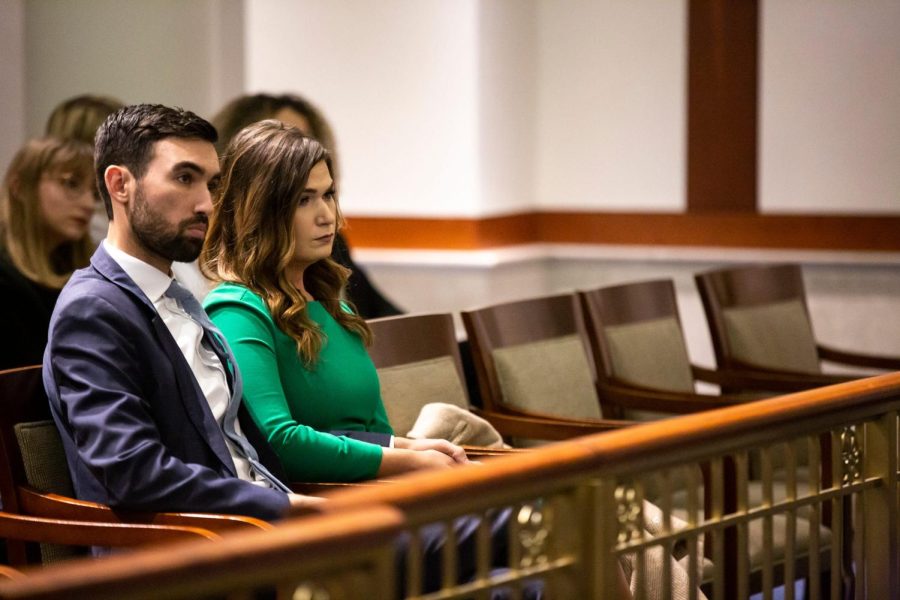Iowa Supreme Court to decide on allowing Abby Finkenauer back on the ballot in the coming days
Abby Finkenauer’s lawyers argue there is no section of Iowa law that allows disqualification for undated petition signatures.
U.S. Senate candidate Abby Finkenauer, sitting next to her husband, Daniel Wasta, listens to oral arguments before the Iowa Supreme Court in Des Moines on Wednesday, April 13, 2022, in her appeal of a judge’s ruling that says she cannot appear on the June 7 Democratic primary ballot. (Kelsey Kremer/The Des Moines Register)
April 13, 2022
The Iowa Supreme Court will decide in the coming days whether U.S. Senate candidate Abby Finkenauer can be on the ballot as the June 7 Democratic primary approaches.
The court heard oral arguments over the case on Wednesday, brought by a pair of Iowa Republicans who argued Finkenauer did not get enough valid signatures to be on the ballot.
The case hinges on three signatures on Finkenauer’s nominating petition — two in Cedar County and one in Allamakee County, which do not have valid dates next to the voters’ signatures.
On Sunday night, a judge agreed with the Republicans who brought the case and ruled Finkenauer does not have the necessary amount of signatures to appear on the Democratic primary ballot in June.
Gary Dickey, the lawyer for Finkenauer’s campaign, argued a missing date on three signatures does not call for disqualification of the signatures.
Iowa Code requires that people signing nominating petitions “shall add the signer’s residence, with street and number, if any, and the date of signing.” But elsewhere, Iowa Code lists reasons that could invalidate a voter’s signature, and a missing date is not among them.
“Iowa law does not state that petition signatures can be invalidated because they are missing a date. We have met every single requirement to be on the ballot for U.S. Senate, as the Secretary of State’s Office and the bipartisan State Objections Panel have already affirmed,” Finkenauer wrote in a press release.
“The district court’s ruling should be reversed because it committed legal error in reversing the panel’s well-founded decision,” Dickey wrote in a legal brief for the case.
Dickey also noted the secretary of state initially accepted Finkenauer’s petition without issue, and urged the Supreme Court to note that the supreme court to note the secretary of state’s review of the petitions when making their decision.
“The secretary of state’s office took a look at the initial instance and did not return it for having insufficient signatures,” Dickey said.
Alan Ostergen, a conservative lawyer representing the objectors, argued the missing dates violate Iowa Code and fail to qualify Finkenauer for the June primary. He argued the date is needed to avoid fraud.
In addition, Dickey argued the objectors to Finkenauer’s nomination do not have standing due to them not being registered Democrats, thus not being eligible to vote in the Democratic June primary.
Finkenauer has derided the legal challenge to her petition as a partisan attack, suggesting that Republicans are trying to keep her off the ballot to prevent her from challenging Grassley in the general election.
“This case was brought by Republican political operatives and has been cheered by the same dangerous anti-democracy interests in Washington that continue to try to restrict Americans’ access to and choices on the ballot,” attorney Marc Elias, who is representing Finkenauer, wrote in a statement Monday.
Alan Ostergen, the objectors’ lawyer argues that his clients, Kim Schmett and Leanne Pellett do have a standing to be objecting to Finkenauer.
Iowa Justice Edward Mansfield said the court has seen political cases like this and has made a standing regardless.
“I’m assuming that the people who filed this case are not supporters of your client, and would prefer not to have her on the general election ballot,” Mansfield said. “But that’s true of any one of these cases and the courts always find standings, so how is this different?”



